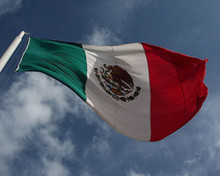
According to a report by Televisa, one of more than 50 reported signatories of the agreement, the new code rejects violence, promotes citizen participation and proposes actions to preserve freedom of expression.
"According to the major international agencies covering the issue, Mexico is one of the riskiest countries to be a journalist and for freedom of the press, due to pressure from organized crime," the agreement says.
"The challenge facing the media is to secure informants for whom the risks are high. To achieve this, we need a strategy that allows informants [to] continue with their work and not be stopped by the terror. Today, freedom of expression is threatened."
The ten criteria within the code include an agreement to stand against violence motivated by organised crime, to not prejudge guilt, to prevent criminals becoming victims or public heroes and to "ignore and discard" information that comes from criminal groups.
The agreement also calls for protocols and measures to be established for the safety of journalists and reporters covering such topics.
According to the Committee to Protect Journalists, more than 30 journalists and media workers have been murdered or have vanished in Mexico since December 2006.
In a report at the end of last year, Silence or Death in Mexico's Press, the CPJ reported that its research had identified Mexico as one of the deadliest countries in the world for the press and one of the worst nations in solving crimes against journalists.
"CPJ researchers have travelled the breadth of the country over the course of four years, interviewing dozens of journalists about the dangers of their work and the devastating self-censorship that has resulted from anti-press violence," the report adds.
Responding to this week's agreement the CPJ's Mexico representative Mike O’Connor said that some organised crime groups may still be able to block parts of the agreement through intimidation.
"These are extremely difficult goals in parts of the country where organized crime is threatening journalists and news organizations. In these areas, ordinary journalism has been all but suffocated. Running stories demanded by crime cartels, or shaping coverage to what they want, is seen by many journalists as the only way to survive."
But he said it was important that local, regional and national news organisations had come together "to offer a concerted response" and welcomed the agreement's commitments to "consistently cover the issue of violence against the press and to cover attacks against journalists", including those against competing news outlets.
Image by Christian Frausto Bernal on Wikimedia. Some rights reserved.
Free daily newsletter
If you like our news and feature articles, you can sign up to receive our free daily (Mon-Fri) email newsletter (mobile friendly).
Related articles
- South American journalists use social media to publish uncensored versions of their investigative stories
- Tip: Things to keep in mind when working with fixers
- 'You're holding a device that looks like a gun' – The dangers of mobile journalism in war zones
- Are drones a new avenue for data journalism?
- One Liner aims to help newsrooms understand editorial analytics platforms









